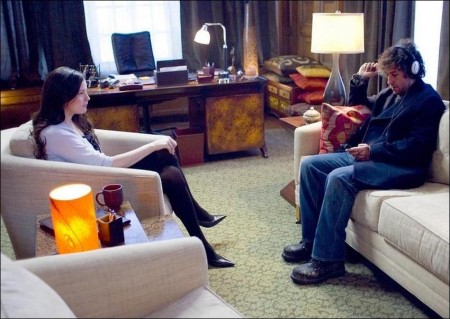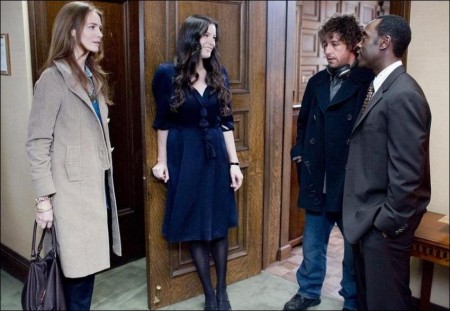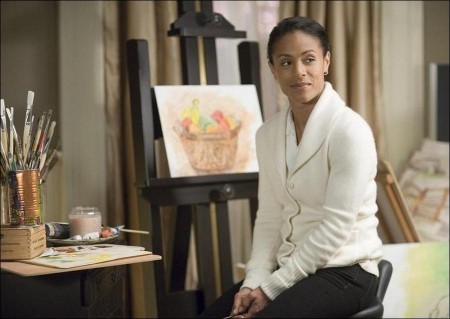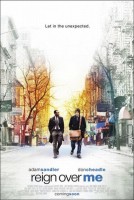Tagline: Let in the unexpected.
A man who lost his family in the September 11 attack on New York City runs into his old college roommate. Rekindling the friendship is the one thing that appears able to help the man recover from his grief.
Alan Johnson has everything he needs to get through life: a good job, a beautiful and loving wife, and their wonderful children. Yet he feels isolated because he finds having a hard-working job and managing a family too much to handle and has no one to talk to about it.
Charlie Fineman, on the other hand, doesn’t have a job or a family. He used to have both until a terrible loss, and the grief caused him to quit his job and isolate himself from everyone around him. As it turns out, Alan and Charlie were roommates in college, and a chance encounter one night rekindles the friendship they shared. But when Charlie’s problems become too much to deal with, Alan is determined to help Charlie come out of his emotional abyss.
About the Production
Adam Sandler plays a man who lost is family in the 9/11 attacks on New York, but when he rekindles the friendship with an old college roommate (Don Cheadle), it helps him get over his grief.
“I always wanted to write a story about friendship,” says Mike Binder, writer-director of Columbia Pictures’ new drama, Reign Over Me, which stars Adam Sandler and Don Cheadle as old friends who reconnect after years apart.
The two become lifelines for each other as each experiences a difficult passage in his life. “Every one of us needs a friend to help us through the tough times. This whole movie is about communication – two men who, together, learn to start talking.”
At the center of Reign Over Me is the relationship between Charlie Fineman (Sandler) and Alan Johnson (Cheadle), former college roommates who meet again by chance after many years.
Charlie has lost his entire family. He is a man whose grief is so great that he has isolated himself and withdrawn from his former life. While Alan’s life seems perfect in comparison, he is nevertheless overwhelmed by his family and professional responsibilities and needs support in order to learn to see the blessings he has.
“One of the common denominators for people who have endured the loss of a loved one is that they are pulled out by their friends and family, and I wanted to show that,” says Binder. “Alan, on the other hand, feels he’s unable to communicate what he needs. He’s in a great marriage, but he’s not showing up for it. The soul of this movie is the story of two men who don’t have anyone to talk to but who, as the movie progresses, find they have each other.”
Around Sandler and Cheadle, Binder cast a group of veteran actors and rising stars. Jada Pinkett Smith stars as Janeane Johnson, Alan’s stalwart and beautiful wife, and Liv Tyler is Angela Oakhurst, a young therapist whose earnest desire to help people may just be the stepping stone Charlie needs to help him on his way to recovery. Saffron Burrows plays Donna Remar, a beautiful but troubled young woman who enters both Charlie’s and Alan’s lives in unexpected ways. Rounding out the cast is Donald Sutherland as Judge Raines. Binder, a critically praised actor in his own right, cast himself as Charlie’s business manager, Sugarman.
Attracting such an accomplished ensemble cast is a testament to the strength of Binder’s story and rich characterizations. “Mike writes with a cast in mind,” says Jack Binder, the writer-director’s brother and the film’s producer. “Once they’re on board, he’ll work with them to build their back story and tailor the material to their strengths. Initially, though, I think actors are simply attracted to the beauty of his writing.”
As an actor, Mike Binder is sensitive to the acting process and creates a trusting, collaborative environment. Co-producer Rachel Zimmerman adds, “Mike doesn’t like taking script notes from many people, but an actor he will always listen to.”
The film’s setting also becomes a character in the film. Many of the exterior shots take advantage of New York’s restaurants and bars, cinemas and apartment buildings. Rather than the landmarks and vistas that make the city famous, Binder focuses his lens on the everyday places that give the city its character.
“All of those sequences where Charlie and Alan go scootering at night, eating Chinese at three in the morning – all of that is part of how a person would live in New York were they a little bit lonely and troubled or just wanting freedom. The city comes to represent a lot about the way they feel,” says actress Saffron Burrows.
“It’s a New York story,” states Zimmerman. “The decision to film there was one of the most important creative decisions in pre-production. So much of the film is Adam Sandler’s character riding around in the streets on his scooter in the cold. This character could only have been captured in New York itself.”
The crew covered a lot of ground over nearly a month of shooting. “We used every opportunity to get as much of the exteriors, backgrounds and taste of New York as we could – everything up to the front door of the buildings,” comments Jack Binder. Spending long nights in the East Village, where the bulk of the scooter action was filmed, the crew captured the soul of the city.
One of the reasons that the story is set in New York is that Reign Over Me was born out of Mike Binder’s experiences and observances on a day of tragedy. The writer-director was in New York on September 11th, 2001. “I wandered the streets, seeing people who had lost their whole lives in one day,” he recalls. “A year-and-a-half later, I was back in New York with my family, remembering all those people I had seen. I kept thinking that for a lot of them, that day never ended – their trauma was ongoing. That sparked the idea to do a story about a survivor, years on, and the people in his life who pull him through.”
This nascent script idea resonated with Binder’s longtime friend and producer Michael Rotenberg, who was with Binder on that fateful day in New York. “In one chilling moment, a person’s whole life can change,” he says. “Whether it’s 9/11, the tsunami, or another calamitous event, the randomness of fate can leave a person stripped of all they love. Then, after a few weeks after a period of time during which it seems the whole world is standing by their side, these individuals are left on their own to make sense of their situation.”
Reign Over Me takes its title from a song on The Who’s landmark album, “Quadrophenia,” which Mike Binder says he played incessantly as he wrote the script. Like Binder’s film, the album deals with a fractured individual who is unable to communicate. “‘Quadrophenia’ was a really special album for me when I was growing up,” he says. “I was a huge fan of The Who and I wanted the movie to have the same feeling as their work – a kind of joyous pain.”
Binder has always written to music. His tastes are eclectic, but for this film he focused on a particular era he felt best represented Charlie Fineman. “People hold onto music from a certain part of their life and in Charlie’s case he’s holding on to an era that predates his wife. So he goes back to an earlier time and obsesses on music from the ’70s and ’80s as a way of avoiding everything he’s endured since then. He’s hiding in this era of music.”
The eccentric music choices are just one mark of Mike Binder’s voice as writer-director. As Zimmerman points out, Binder’s sense of storytelling lends itself perfectly to Reign Over Me. “He comes from an independent filmmaking background,” she says. “He focuses on story and the relationships between characters. Also, because he often takes a small role in his pictures, he’s able to work very closely with the actors. The final result is that the actors trust him and rely on his instincts.”
Another characteristic that marks Binder’s voice is the subtle and delicate comedy woven into the screenplay. As he did in The Upside of Anger and other films, Binder’s gently comic touch captures life’s bittersweet moments. “We all tried to find the comedy as much as we could because it provided a good counterpoint to the tragedy that Charlie is dealing with,” says Cheadle.
“Every script I write starts as a comedy, but my favorite comedies always come from a real place,” says Binder. “As I strive for that, the stories just seem to come out with dramatic themes.”
About the Characters
For Mike Binder, the most important part of casting a film is finding actors whose response to the material stems from a deep emotional empathy with the characters. “I don’t want somebody to do a movie because of the money or because it would be a good career move,” he says. “I’m looking for actors who say, ‘Something about this part is touching me.’”
Binder began the casting process by seeking out the actor who would play Charlie Fineman, the lost man at the center of the story. “Charlie’s never been able to get off the couch,” the writer-director continues. “He doesn’t talk to anybody; he wanders the city late at night on his little motor scooter and has no relationships with anybody.” To walk the fine line between Charlie’s comic and heartbreaking moments, Binder cast Adam Sandler.
For Binder, Sandler brought the character to life, making real a man who has experienced a great loss. “I love the character he created,” says Binder. “It’s original. I love the way he walks, I love the way he and Cheadle fight about who’s going to play drums and who’s going to play guitar. He’s the kind of friend you always wanted to have. There’s a humility about the character that makes me laugh.”
In creating the role, both Sandler and Binder researched the psychology of people who had experienced the loss of a loved one. “We both did a lot of reading and talking with as many people as we could,” says Binder. “We researched therapists and doctors and people who had lost their families, from people who lost spouses or parents to people whose loss was only tangential – third- and fourth-cousins.” Through this, the filmmakers and actors were able to see firsthand not only the effect of a terrible loss on a person like Charlie, but also how that person’s reaction affects those around him.
Gaining both perspectives was critical, of course, because the character of Charlie was just the starting point. The heart of the film would focus on the profound friendship between Charlie and his long-lost college roommate, Alan Johnson. “When I started to read about people in different scenarios who had suffered terrible loss, they all seemed to speak about the love of a person – friend or family member – who got them through and helped them move on,” says Binder.
Key to portraying that on screen was Sandler’s relationship with Don Cheadle. From the moment the actors first got together, Binder knew the relationship would work. “They were over at my house – hanging out in the backyard – and you could see these two guys just liked each other,” he says. “They have a lot of similar qualities and interests. They’re both athletic, both talented musicians, both intelligent and talented guys. They had chemistry.”
For Cheadle, that chemistry is replayed between the characters in the film. “My character’s a mess and Adam’s character’s a mess,” he says. “It was interesting playing these two guys who need each other to figure things out, even if at the end of the film you’re still not necessarily sure what it is they’ve figured out. It’s not overly simplistic and that’s interesting.”
Though Charlie is the one with deep, profound issues, Alan is not without burdens of his own. “At the beginning of their relationship, Alan’s not trying to help Charlie – Alan’s trying to help Alan,” Cheadle continues. “He’s found an outlet, somebody he can kick it with – and he hasn’t had that for a long time. He needs that. He plays on the fact that Charlie is sick in order to get permission from his wife to spend more time with Charlie, but that has the unintended consequence of giving him some perspective on his own life, gratitude for what he has, and a rekindled affection for the people in his life.”
The problems that Alan faces are not the insurmountable, irreconcilable differences of two people who have grown apart, but merely a downturn in the cycle of a strong marriage. “Don’s character is in a good marriage. He’s just not showing up for it,” says Binder. “He needs some air but isn’t able to express this need. Inadvertently, his relationship with Charlie helps him do that. When Charlie and Alan go out at night, they’re not looking for affairs, or to get drunk and cause trouble – they just want to have fun like two innocent kids. It’s good to see adults just want to have a little fun and not looking for adult fixes.”
Though the relationship between Charlie and Alan is at the center of the film, the characters surrounding them show how changes in one life can have rippling affects upon the people around them. Jada Pinkett Smith, who plays as Alan’s wife, Janeane, understood that the character had to be strong, but not overbearing. “I thought it was important to show her inner strength, but still make the character a woman who needs Alan to return – and who Alan needs to return to,” says Pinkett Smith. “It was an interesting balance. She’s very patient, she knows and loves her husband, and she believes they will get to a resolution.”
“Janeane has to be a strong woman – otherwise, you might ask, ‘Why is she letting him do all these things?’” says Binder. “But with the way they communicate, you get a better sense of what goes on at home. She’s not letting him get away with something. She’s enduring, tolerating as he goes through what he needs to go through.”
Liv Tyler takes on the role of Dr. Angela Oakhurst, the therapist who plays a key role in the lives of both Alan and Charlie. “My character works in the same building as Don’s character – he needs somebody to talk to, but won’t commit to making an appointment. He’ll wait for her, then pretend that it’s just coincidence that they’re always bumping into each other. She’s the person he thinks of when Charlie is ready to get the help he needs.”
The character of Donna Remar enters Alan’s and Charlie’s lives in an unusual way. To play the role, Binder sought an actress who could convincingly portray both ends of the role’s emotional shift. He found her in Saffron Burrows, who he first saw in a play in London. “I was blown away and knew she’d be right for the role,” he says. “I had her and Adam get together and you could see this tender awkwardness about her that really worked well. She’s a wonderful actress.”
The director describes Burrows’s character as a woman who is in as painful a place as Charlie and Alan are. “She’s a beautiful woman who’s been destroyed by a very tragic marital split,” he says. “She’s an odd creature who keeps coming into Alan’s dental office and propositioning him in a very odd way, but when we begin to know her, we realize how wounded she is.”
Of her character, Burrows says, “Donna is pretty troubled; I think of her as untethered. She doesn’t really have any guy ropes. She’s like a tent flapping in the wind. She was fun to play.”
For one key role, Binder cast himself. As soon as she read the first draft, co-producer Rachel Zimmerman knew which role he’d be playing: the “unlikable” Sugarman. “Mike would never say that Sugarman’s a bad guy. He picks the unlikable characters because he’s such a likable guy,” she says. “He likes to act – I think it makes him feel like part of the team, and I think the rest of the cast feels that way, too. Besides, Sugarman’s in a lot of great scenes.”
Production notes provided by Sony Pictures.
Reign Over Me
Starring: Adam Sandler, Don Cheadle, Jada Pinkett Smith, Liv Tyler, Safforn Burrows, Cicely Tyson, Robert Klein, Melinda Dillon
Directed by: Mike Binder
Screenplay by: Mike Binder
Release Date: March 23rd, 2007
MPAA Rating: R for language and some sexual references.
Studio: Sony Pictures
Box Office Totals
Domestic: $19,661,987 (88.5%)
Foreign: $2,560,321 (11.5%)
Total: $22,222,308 (Worldwide)



